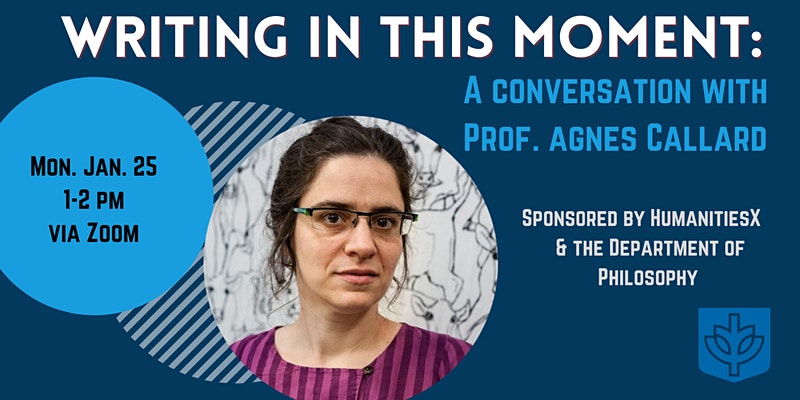Last Monday, HumanitiesX worked with DePaul’s Department of Philosophy to host their latest Writing in this Moment event, inviting Dr. Agnes Callard from The University of Chicago. Dr. Margaret Storey from DePaul’s Department of History led a conversation about Callard’s experience writing about philosophy for public audiences.
An instructor in philosophy, Callard also operates as a public philosopher through her freelance writing. Callard has written for The New York Times, The Boston Review, and The New Yorker on different topics of philosophy, like “Should We Cancel Aristotle?”, “The Philosophy of Anger”, and “What do Humanities do in a Crisis?”.
The webinar kicked off with Callard relating her experiences as a public philosopher. She began by telling a humorous story from her time at a remote conference for the American Philosophical Association where, during a breakout room session, she joined the room discussing philosophy in the pandemic. To her surprise, she was the only one to show, which made her think of the sentiment that “psychologically healthy, academically successful philosophers don’t go near Twitter.”
“I do think there’s a sense in the discipline of holding oneself back,” said Callard, “that there’s a quagmire or moras or a corrupting force that we could be getting ourselves into. If you’re interested in philosophy, why not just do philosophy? Just talk to other philosophers. That’s why I became a philosopher – for the company. There’s something valuable in not retreating.”
She went on to relate the importance of public assemblies to public discourse in Athens, saying that forums like these allow us to engage our intellectual thoughts. Media platforms like Twitter, offer these assemblies, a space for philosophers to test their ideas, especially during a pandemic.
“People really are interested in philosophical ideas, and you can test out your ideas on them through things like Twitter.”
She also offered advice for public writing, her most emphasized point being… get to the point. To her, it’s imperative that you give public audiences the core of your idea, and that this strategy will help you by revealing your most important ideas. It’s also useful to consider the specific reasons for a public audience with philosophy.
“We go through our lives presupposing answers to a bunch of questions that we think important. We already have answers before the questions.” She goes on to iterate that philosophy helps cast light on those answers and questions, helping us gain insight into how we think.
Many questions were posed to her during the conversation, such as Storey’s question about how academic thinking has changed during the pandemic. Callard answered that there’s an idea that the pandemic is a challenge to academics over their worth and function, an idea that she asserts is false. She goes on to say that the “weight” of a pandemic prevents academics from accessing those higher levels of thought that make them what they are. In essence, a crisis prevents us from being at our best. There is no Nietzshezian test to struggle through.
Callard left off with the advice that philosophers need to offer arguments, not answers, because otherwise we cannot generate new ideas, new knowledge. Through engagement with public audiences through media, we can do this on the streets (albeit digital) as opposed to in the towers.
For the full experience, you can now watch the webinar for free on YouTube.
